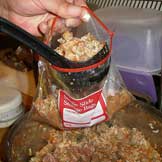
I recently ran across a couple of troubling statistics that relate to pet nutrition. According to the American Animal Hospital Association, only seven percent of pets that could benefit from a therapeutic food are actually fed one. Therapeutic diets include foods that are designed to aid in the management of specific diseases including obesity, urinary stones, osteoarthritis, kidney, liver, and heart disease, etc.
Also, the Pet Nutrition Alliance reports that 90 percent of pet owners want a nutritional recommendation from their veterinarian, but only 15 percent feel like they’ve been given one.
I don’t have a good explanation for the first of these findings. I’m sure I’ve missed making appropriate nutritional recommendations for some of my sick patients, but not 93 percent of them. The second statistic, though more extreme than I’d expect, makes more sense, and I think owners and veterinarians have to share the blame. Let me explain.
I have found that when pet owners say they want guidance as to what food to feed, they want a very specific recommendation. For example, Mrs. Smith wants to hear, “Variety X of Brand Y dog food is the best food you can give Rover.” There are at least two problems with recommendations like these.
First of all, there is no one “best” food out there. Dogs are just like people in that individuals respond in their own ways to different diets. Some dogs will thrive no matter what they eat (within reason, of course). For others, it takes some legwork and trial and error to find a food that works well, and even then, there’s probably more than one that will fit the bill. So while a veterinarian may have confidence that Brand Y is a good dog food, he or she really can’t look you in the eye and say it is the best or even one of the best for your dog.
The second problem relates to the owner perception that has gained traction of late that veterinarians are in the pocket of the pet food industry. This has made some doctors gun shy when it comes making brand-specific recommendations lest we lose credibility in the eyes of our clients. We resort instead to generalities like “feed a high quality food” or “low fat diets are best for dogs that need to lose weight.” Unfortunately, many owners don’t know what to do with vague recommendations like these.
I make my way through this minefield by offering clients several suggestions that I feel comfortable with and allowing them to make the final decision. For example, I might say to an owner, “Rover could benefit from a diet with high levels of omega-3 fatty acids. Company X and Company Y both make excellent foods called Abracadabra and Magic Morsels that would be appropriate for Rover, or if you’re happy with his current diet you could add the contents of two fish oil capsules to his morning and evening meals.”
Owners can help the situation by raising the topic of nutrition during appointments. During a wellness exam ask your veterinarian, “This is what Rover is currently eating; what do you think?” After a new diagnosis, ask, “Does this affect what Rover should be eating? Are there a couple of foods you’d recommend?” As long as the conversation occurs, it doesn’t really matter who brought the subject matter up.

Dr. Jennifer Coates
Image: Thinkstock









